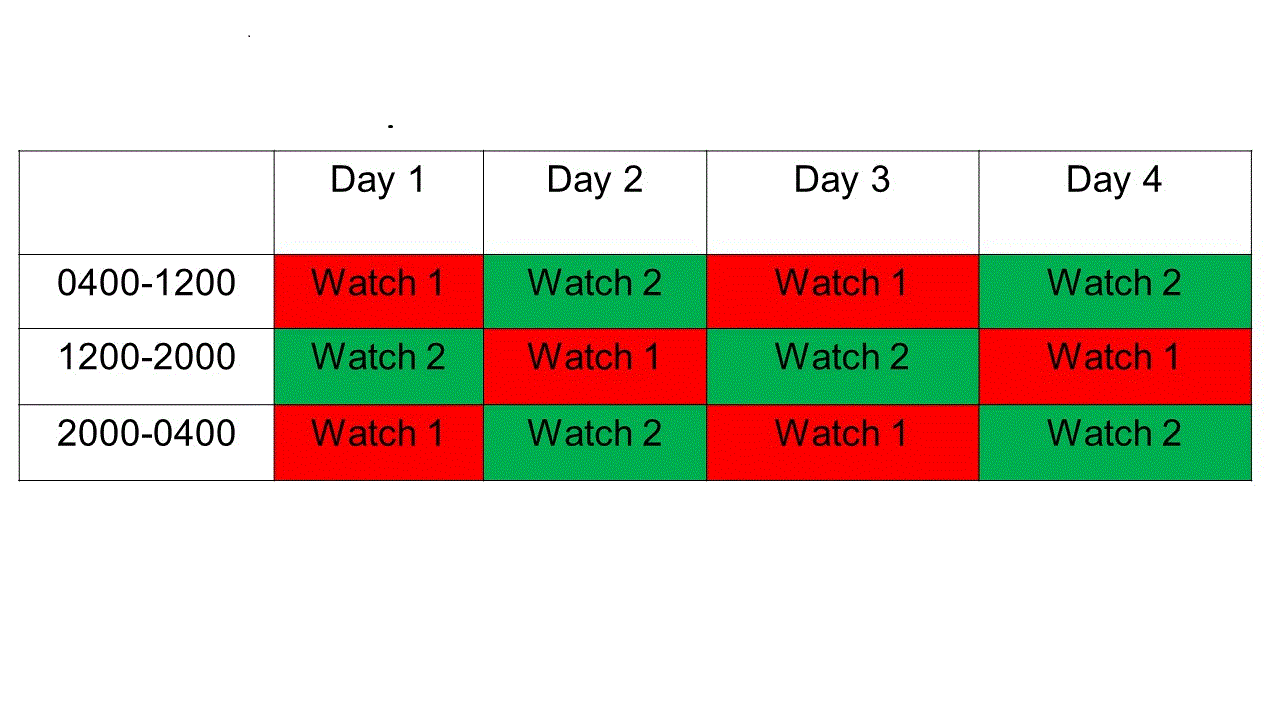For the few of you that have viewed my Notes or read my Stacks, I thank you. As you can probably tell I’m not a writer. I’m just a guy, doing his job that puts down his musings between making and giving briefs to officers (as well as other bits and pieces). You might have noticed that I’m a military man. I’m a member of His Majesty’s Royal Navy. If you ever watch anything that is ceremonial to do with the Royal Navy you will always notice that we appear at the front. This is due to us being known as “The Senior Service” (1). I highly recommend watching us British doing some kind of ceremonial (The Queens funeral or the Kings Coronation for example.) as we are pretty good at doing all the pomp and ceremony.
If you’ve read my Stacks you would have noticed me mention something known, as Watch-keeping. Oh the joys of watch-keeping. I thought I would give the people who read this a brief overview on what it is and what it entails. If I can find some bits in my online searches then I’ll also mention how it affects my health.
From Wikipedia: Watch-keeping is the assignment of sailors to specific roles on a ship to operate it continuously. These assignments, also known at sea as watches, are constantly active as they are considered essential to the safe operation of the vessel and also allow the ship to respond to emergencies and other situations quickly.
There are a number of different watch systems that are employed whilst at sea. This is to ensure that the main parts of the ship are manned whilst ensuring that sailors get the appropriate rest. The systems that that RN use are the 1 in 4 system, the 1 in 3 system and the 1 in 2 system (also known as defence watches.) I shall quickly go over the ones that I have mainly used just explain how they work
So firstly we have 1 in 3 system. Please see above for how this works. As you can see you’re keeping watches every day. During my naval career (and due to my specialization) this is the watch system that I have done the most. You keep a watch every day and you do look forward to the 1600-2000 watch, known as the Dogs watch. I will point out that if you are Watch 1 and finish the 0200-0800 watch on the second day then you do usually get to go to bed for the morning unless there’s a set of Specials or there’s a major fire exercise you have to take part in. You have to remember that whilst at sea, WE are the fire brigade. I’ve had to face one major fire in my time and it was hell in a box.
As you can see by the image above, this is the 1 in 2 watch keeping system. Two watches, Port (not the drink) and Starboard. This is generally used when a warship needs to be at a higher state of readiness but can also be used when you have a small pool of personnel doing the same position like I’m currently experiencing now. Me and my opposite number (his nickname is Crash) have been doing these type of watches since September. You don’t get a day off. You’re generally tired all the time. In the 8 hours you have off you’re expected to eat, gym, sleep, shower and try and chill out. I’m afraid to say my gym kind of slips but when I do I tend to watch saved YouTube videos whilst I cycle.
The personnel on board a ship that keeps a watch are the Bridge team which consists of and Officer of the Watch and a couple Yeoman. You will have the Operations Room team which monitors the radars and makes sure we’re not going to hit anything. The Marine engineering team in case anything breaks. These will also contribute member to the SHAP which stands for the Silent Hours Attack Party incase of a fire or a flood.
It should also be pointed out that if you are off watch and there’s a whole ship emergency then your sleep is interrupted and you have to go and help out if you’re needed. Luckily that’s not happened this time. I’m thinking I might do a little article on Navy speak, otherwise known as “Jack speak”. For the Americans who read this, we tend to visit New York or Jacksonville so if you ever want tour then let me know LOL.
Ooooo I nearly forgot. Effects on health. I found this about sailors on submarines but it can also be used by anyone that watch keeps. Here’s an extract.
“Sleep was the most often outcome investigated with only a few studies looking at cognitive performance and/or physiological health. The 6h on/6h off was the most studied schedule which generally demonstrated poorer sleep, cognitive performance, and physiological health than other schedules (e.g., 4h on/8h off, 6h on/12h off). This is important as this schedule is the most frequently used by navies around the world.” (2)
Anyways I hope that anyone that reads this finds it interesting. If you have a partner that does any form of watch-keeping then I hope this kind of opens your eyes as to why he or she might be a little grumpy on occasion. It’s not you. It’s the shifts. Please comment below if you’ve had to do watch-keeping of ANY kind.
I hope this finds you happy and healthy.
Vulkan
(2) https://academic.oup.com/sleepadvances/article/3/Supplement_1/A53/6811590







Anyone who writes more than a paragraph consistently is a writer, so you are a writer.
Thanks for sharing your story.